
COEUR D’ALENE, Idaho (RNS) — Earlier this month, Rep. Marjorie Taylor Greene, the Georgia Republican, addressed the Kootenai County Republican Central Committee, whose purview runs from this small resort city up along the Washington state border. Before she spoke, a local pastor and onetime Idaho state representative named Tim Remington, wearing an American flag-themed tie, revved up the crowd: “If we put God back in Idaho, then God will always protect Idaho.”
Greene’s remarks lasted nearly an hour, touching on a range of topics dear to her far-right fans: claims about the 2020 election being “stolen,” sympathy for those arrested for taking part in attacking the U.S. Capitol and her opposition to vaccine mandates.
She then insisted that Democrats in Washington have abandoned God and truth — specifically, the “sword” of biblical truth, which she said “will hurt you.”
The room of partisans applauded throughout, sometimes shouting “Amen!”
The event may be the closest thing yet to Greene’s vision for the GOP, which she has urged to become the “party of Christian nationalism.” The Idaho Panhandle’s especially fervent embrace of the ideology may explain why Greene, who has sold T-shirts reading “Proud Christian Nationalist,” traveled more than 2,300 miles to a county with fewer than 67,000 Republican voters to talk about biblical truth: Amid ongoing national debate over Christian nationalism, North Idaho offers a window at what actually trying to manifest a right-wing vision for a Christian America can look like — and the power it can wield in state politics.
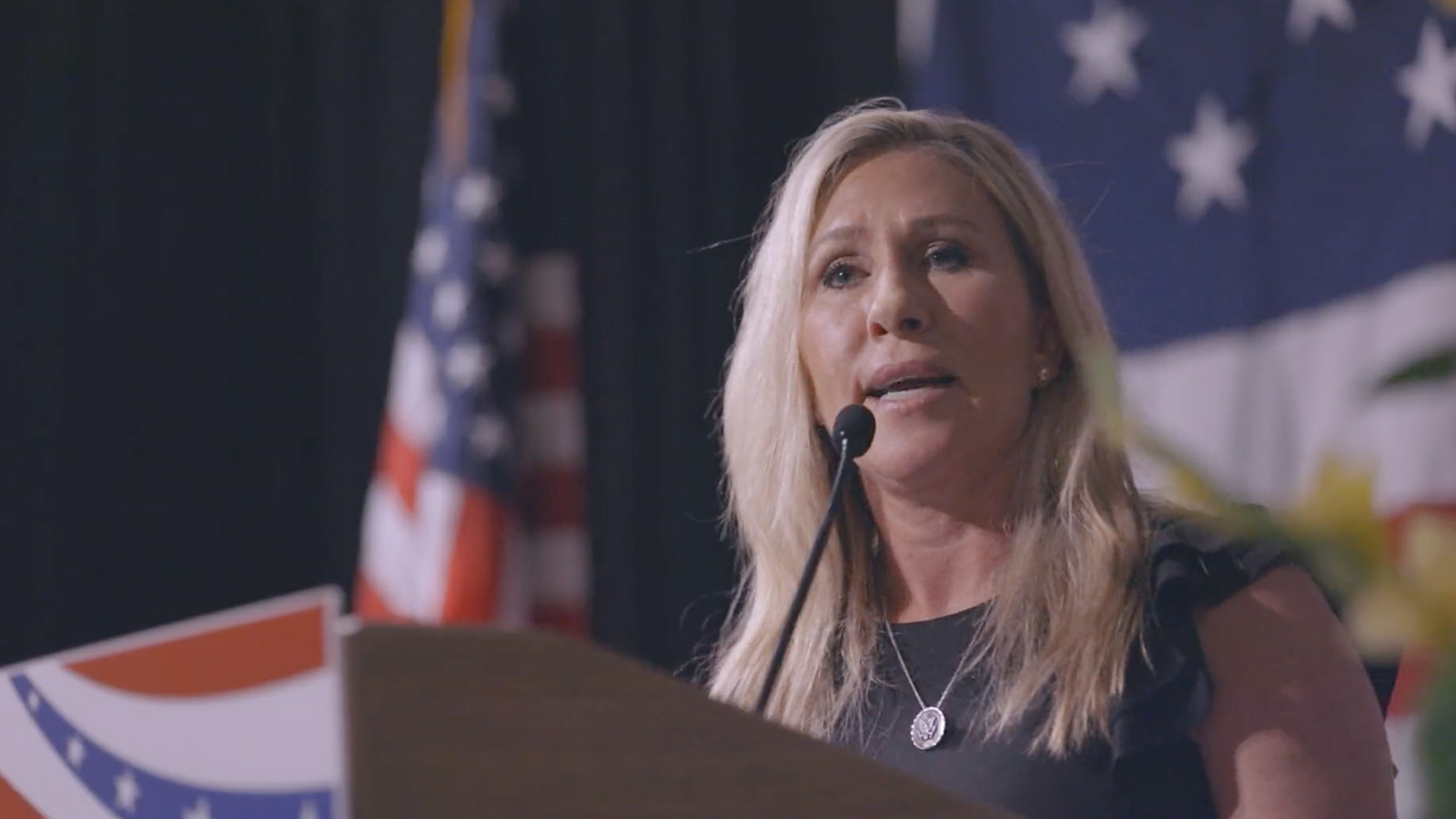
Rep. Marjorie Taylor Greene speaks at the Kootenai County Republican Central Committee Lincoln Day event in Coeur d’Alene, Idaho. Video screen grab
North Idaho has long been known for its hyperlibertarians, apocalyptic “preppers” and white supremacist groups who have retreated to the region’s sweeping frozen lakes and wild forests to await the collapse of American society, when they’ll assert control over what remains.
But in recent years, the state’s existing separatists have been joined by conservatives fleeing bluer Western states, opportunistic faith leaders, real-estate developers and, most recently, those opposed to COVID-19 restrictions and vaccines. Though few arrived carrying Christian nationalist banners, many have quickly adopted aspects of the ideology to advance conservative causes and seek strength in unity.
The origin of North Idaho’s relationship with contemporary Christian nationalism can be traced to a 2011 blog post published by survivalist author James Wesley, Rawles (the comma is his addition). Titled “The American Redoubt — Move to the Mountain States,” Rawles’ 4,000-word treatise called on conservative followers to pursue “exit strategies” from liberal states and move to “safe havens” in the American Northwest — specifically Idaho, Montana, Wyoming and eastern sections of Oregon and Washington. He dubbed the imagined region the “American Redoubt” and listed Christianity as a pillar of his society-to-be.
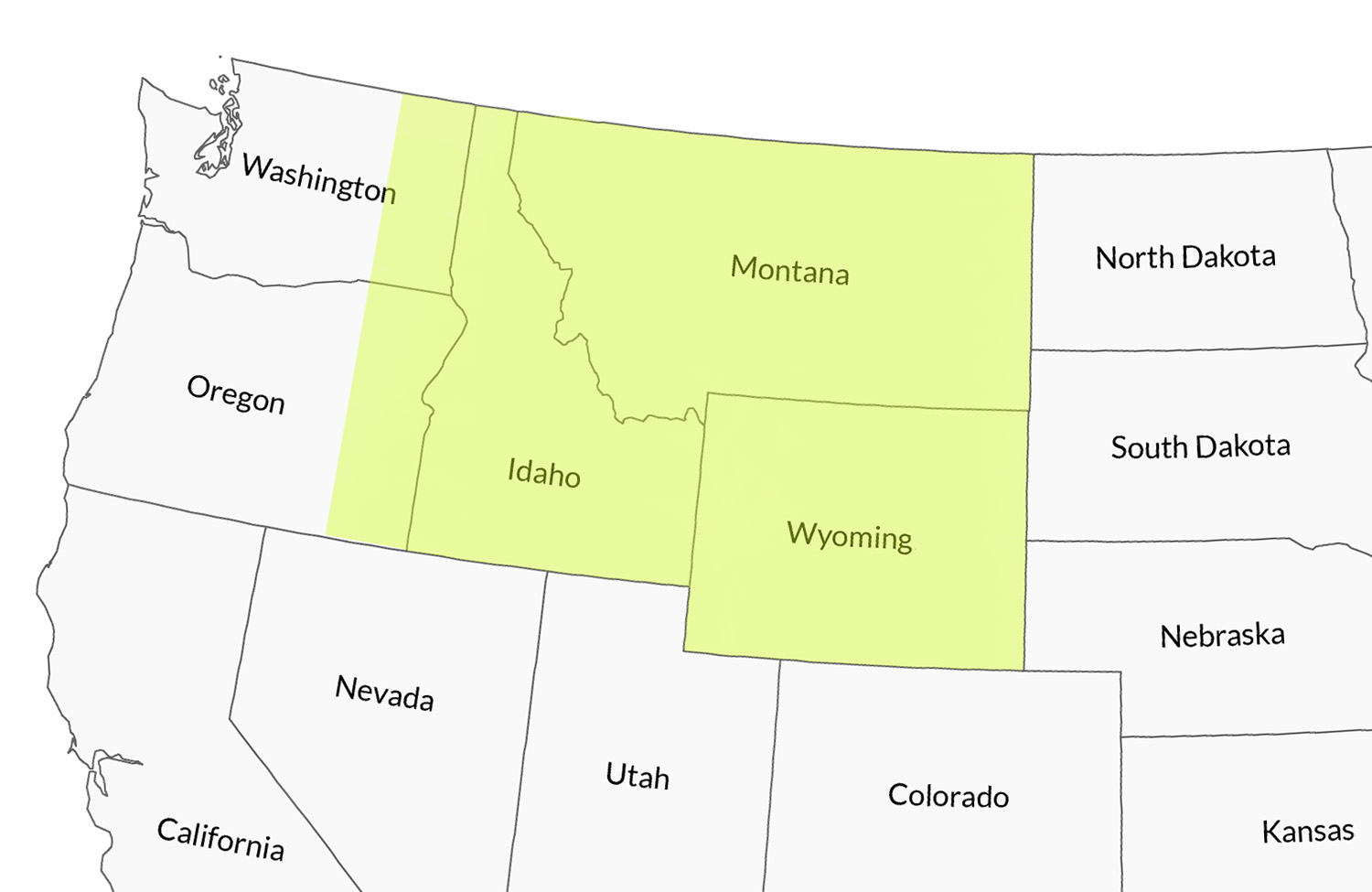
The proposed American Redoubt area in the northwest United States. RNS graphic
“I’m sure that this brief essay will generate plenty of hate mail, and people will brand me as a religious separatist,” he writes. “So be it. I am a separatist, but on religious lines, not racial ones.”
Rawles made an exception for Orthodox Jews and Messianic Jews, saying they would also be welcome in the Redoubt because they “share the same moral framework” as conservative Christians. But the post, which has been updated multiple times since, concludes with a list of “prepper-friendly” congregations in the Reformed Church tradition (Rawles is a Reformed Baptist).
“In calamitous times, with a few exceptions, it will only be the God fearing that will continue to be law abiding,” writes Rawles, who declined to be interviewed for this article.
Rawles’ reach was magnified by outlets such as Radio Free Redoubt, a podcast geared toward “God-fearing, liberty-loving patriots,” and Redoubt News, an “online publication featuring the Christian conservative culture.” This loose group has a political champion in Idaho state Rep. Heather Scott, who represents the northernmost tip of Idaho’s Panhandle, wedged between Washington and Montana. (Scott was there to hear Greene speak in Kootenai County last week; Idaho’s GOP chairman, pointing her out to the congresswoman, described Scott as “the Marjorie Taylor Greene of Idaho.”)
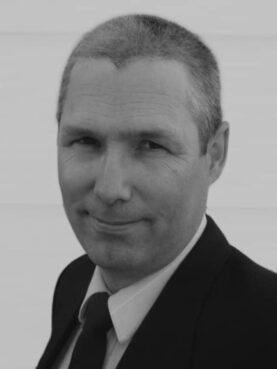
James Wesley, Rawles. Courtesy photo
The Redoubt is growing rapidly, bolstered by conservative flight chiefly from California. Idaho and Montana have repeatedly ranked among the U.S. Census Bureau’s top five fastest-growing states in recent years. According to a recent study overseen by Jaap Vos, a University of Idaho professor of planning and natural resources, 1 in 4 Idahoans didn’t live there 10 years ago.
Most come, Vos said, for cheaper housing and lower taxes, not Rawles’ clarion call. But Vos noted that when it comes to transplants in North Idaho, motivations go beyond finances. “They want to be around people that are like them,” he said.
Bradley Onishi, who teaches at the University of San Francisco, dedicated a chapter to the Redoubt in his book “Preparing for War: The Extremist History of White Christian Nationalism — And What Comes Next.” He said he knows between five and 10 friends in Southern California — primarily evangelical Christians — who’ve moved to Idaho in recent years.
As he studied the migration pattern, Onishi said, it became clear Idaho had become “the new unzoned land” for residents hoping to remake it in the image of “Christian patriots.”
The influx has given birth to a phalanx of “Redoubt Realtors” who specialize in resettling transplants. Chris Walsh works for Revolutionary Realty, whose webpage features images of bald eagles, American flags and a banner that welcomes visitors to the “heart of the Great American Redoubt, North Idaho!”
Walsh, munching on a sandwich in a diner in Coeur d’Alene, explained that clients seek him out to locate property that is “defensible,” with clear “firing lanes” in the event of invasion. His customers, overwhelmingly preppers, also typically claim the Christian faith. “I don’t remember the last time that I met somebody that wasn’t a Christian,” he said.
But Walsh added that the latest, and by his estimate the largest, concentrated wave of newcomers came during the pandemic.
“The COVID thing really drove a lot of people to get out of Portland, Seattle, San Francisco — anyplace where the government was acting very tyrantlike in terms of lockdowns,” he said. “Up here, we locked down for about three and a half weeks.”
When, a year ago, the Coeur d’Alene City Council was faced with whether to take American Rescue Plan Act funds to support pandemic health measures, citizens approached the microphone at the council’s public session to rail against COVID-19 restrictions and government interference in general, often describing both as “tyranny.”
Over and over, speakers admitted they had only just moved to Idaho. “I moved from Southern California to be free, and I don’t want to be under the chains of the federal government,” one commenter said.
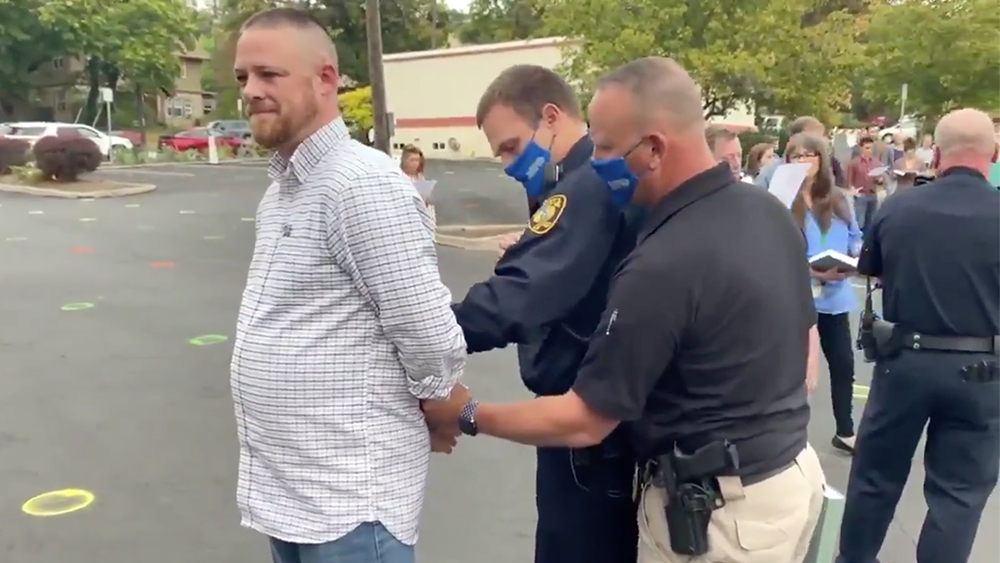
Gabriel Rench, left, is arrested during a “psalm sing” promoted by Christ Church in Moscow, Idaho. Video screen grab
Many churches in northern Idaho refused to close even as the pandemic peaked here. In September 2020, at Christ Church in Moscow, Idaho, founded by Reformed pastor Douglas Wilson, members staged a protest outside City Hall, singing Psalms maskless in defiance of local ordinances, resulting in three arrests.
National Republicans were watching this rebellion among these ardent right-wing Christians and tried to make it an election-year issue. “DEMS WANT TO SHUT YOUR CHURCHES DOWN, PERMANENTLY,” then-President Donald Trump tweeted.
Far from shutting down, Wilson’s congregation has doubled over the past four years. “A lot of the fomented discontent of the last two years, I would say, is 80% of the reason people come here,” said Wilson in a recent interview in his office. The pastor himself, while claiming his take on pandemic rules is more nuanced, has made dismissive fun of masking and argued in favor of fake vaccine cards for the unvaccinated.
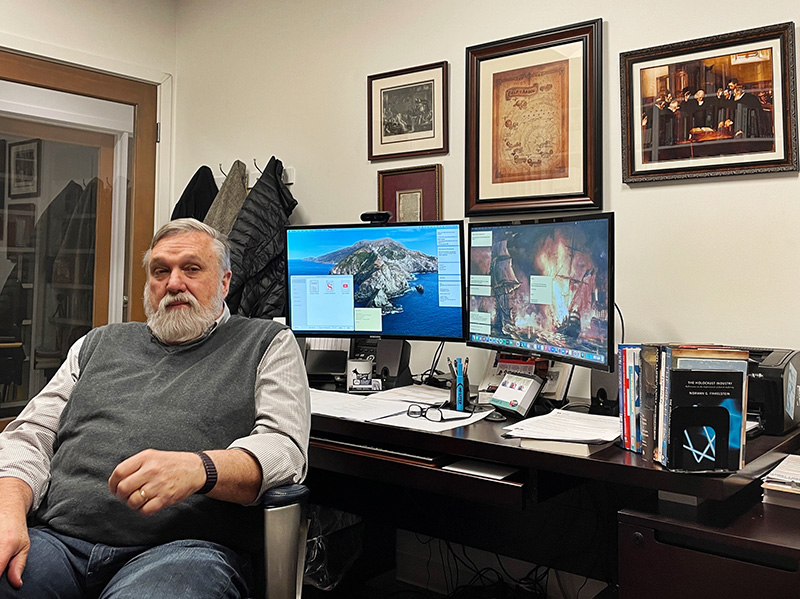
Pastor Douglas Wilson of Christ Church at his office in Moscow, Idaho, on Feb. 5, 2023. RNS photo by Jack Jenkins
Wilson, a controversial figure long popular among a subgroup of Reformed conservatives, has recently emerged as something of a Christian nationalist influencer. He blurbed a 2022 book co-written by Andrew Torba, the founder of the right-wing alternative social media website Gab, and Andrew Isker, a Minnesota pastor who graduated from the ministry program associated with Wilson’s church. (The church is also affiliated with a K-12 school in the town and New Saint Andrews College.) Wilson’s publishing house, Canon Press, recently released “The Case for Christian Nationalism” by self-described “country scholar” Stephen Wolfe, who was recently named as a postdoctoral fellow at Princeton University’s James Madison Program in American Ideals and Institutions.
Rawles mentioned Wilson’s congregation in his 2011 blog post and even wrote a version of Christ Church into one of his survivalist novels, but Wilson insisted he doesn’t consider himself a “card-carrying member” of the Redoubt movement. (Wilson also claimed he wasn’t overly familiar with Rawles’ books until recently, although they were in his orbit: In a 2009 photograph in Christianity Today, a Rawles novel appears on a bookshelf behind Wilson, something Rawles celebrated on his blog at the time.)
In the interview in Moscow, Wilson also downplayed his church’s publicly stated intention to make the place a “Christian town,” insisting the effort was more about “evangelism and service” than a “hostile takeover.”
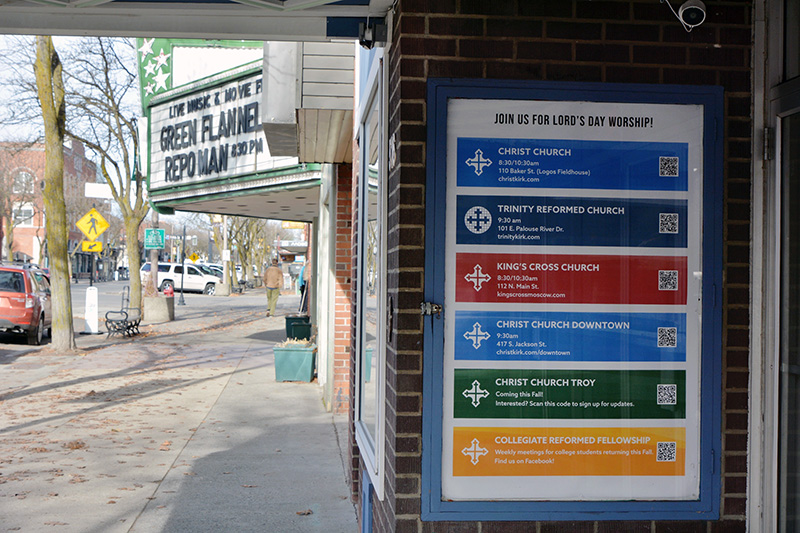
A sign for various churches in downtown Moscow, Idaho, on Feb. 7, 2023. RNS photo by Jack Jenkins
But Wilson doesn’t hesitate to describe his vision of a Christian America. Laws would ban abortion, he said, and while leaders would strive to “maximize religious liberty for everyone,” Catholics are unlikely to feel welcome — “I think it has to be a pan-Protestant project,” he said — nor would Christians who disagree with his stridently patriarchal social norms. When it comes to major social issues such as abortion and same-sex marriage, his theology represents a majority of only two major U.S. Christian groups, according to recent surveys — white evangelicals and members of The Church of Jesus Christ of Latter-day Saints.
Asked to explain where liberal Christians fit into his theoretical Christian society, Wilson said they would be excluded from holding office, later noting similar prohibitions in early American Colonial settlements such as the Massachusetts Bay Colony. When it was pointed out that Puritans executed Boston Quakers, Wilson said he would not “defend” the hanging of Quakers, but then argued it was important to understand the context of the time.
The possibility of the Christian visions of North Idaho coming to pass depends, at least initially, on their gaining political power. While Wilson scoffed at the notion of running for office, he did not rule out the possibility of his church members doing so. Their agenda, he said, would only be “to get the city to leave us alone.”
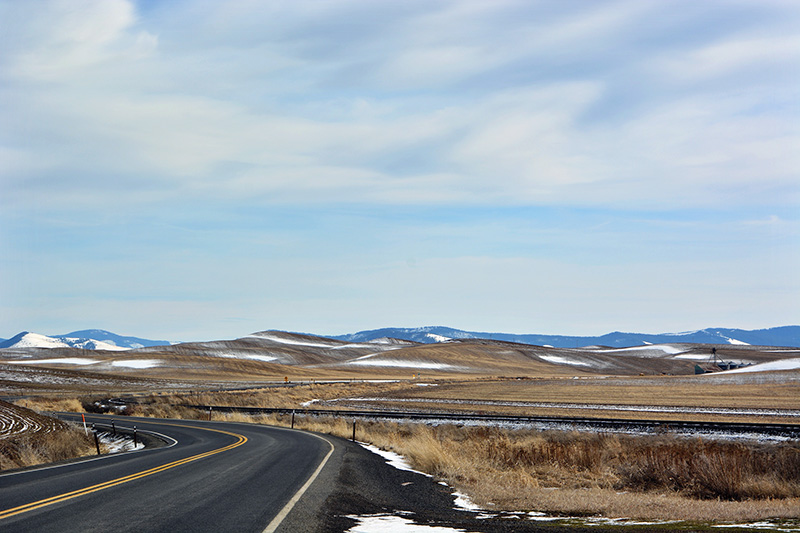
A dusting of snow covers the landscape near Coeur D’Alene, Idaho, in early February 2023. RNS photo by Jack Jenkins
But activist Alicia Abbott, who works with the liberal Idaho 97 Project, said the political influence of conservative churches in the region is growing. Congregations such as Pastor Tim Remington’s The Altar Church, in Coeur D’Alene, regularly host forums for right-wing candidates, and since the pandemic they increasingly, and dramatically, espouse Christian nationalist ideas.
“It’s an issue across the state now that we have to deal with, these really bombastic political actors,” she said. “Their ideology is rooted in Christian nationalism.”
During one October service, Remington, who could not be reached for comment by press time, welcomed into the sanctuary a slate of 15 candidates for state and local office. Many were running unopposed, having already won their hotly contested Republican primaries in the deeply red state. But most made a point to connect their campaigns to their Christian faith, and four noted they were members of Altar Church. When they finished, Remington asked for a show of hands of those who intended to vote for “biblical values” while in office. All 15 lifted their hands.
The 12 who went on to win their races include state Rep. Joe Alfieri, who told the Altar Church congregation that “drag queen shows” in parks showed that the country was moving away from “Judeo-Christian values.” Alfieri pushed a bill in early February that would limit access to absentee ballots. Another is State Sen. Ben Toews, who told Altar Church he prayed for people while knocking on doors for his campaign, and who introduced a bill this month that would prohibit any instruction involving human sexuality, sexual orientation or gender identity before the fifth grade.
According to the Idaho Capital Sun, Toews was also one of the founding incorporators of the Idaho Family Policy Center, a group created in 2021 that has authored or championed some of the most conservative bills placed before the state Legislature — including one this month with a provision that would ban books depicting homosexuality from libraries. The Idaho Family Policy Center’s head, a recent transplant, has described himself as a Christian nationalist, and the group’s board includes two men connected to Doug Wilson’s churches and schools in Moscow.
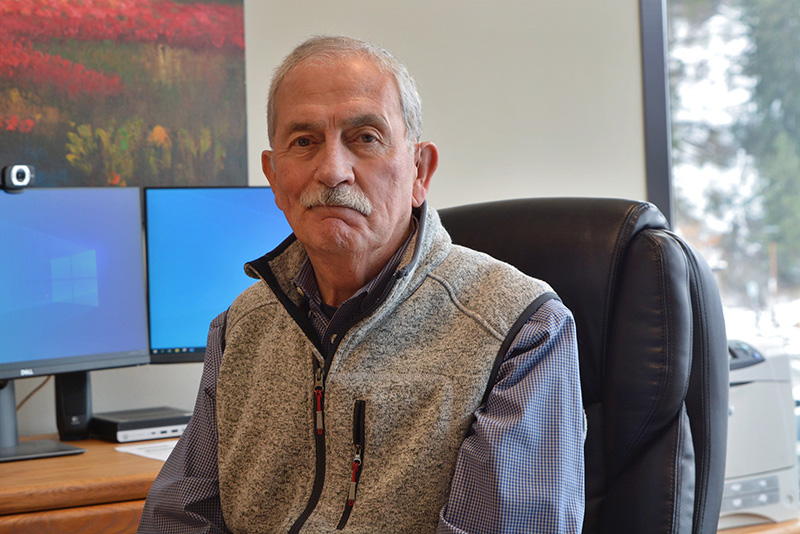
Coeur D’Alene Mayor Jim Hammond. RNS photo by Jack Jenkins
Abbott said it was all part of a larger “takeover” of the state Republican Party by far-right actors too extreme for the state’s established conservatives. Coeur D’Alene’s Republican Mayor Jim Hammond expressed dismay about the growing tone of Christian nationalism in the party. He pointed to a moderate conservative group, the North Idaho Republicans, working to “pull back some of the influence” from Christian nationalists, which, he noted, is inconsistent with his Catholic faith.
“Damn it, it’s not right,” Hammond said. In a later email, he said Greene’s presence at the Kootenai County Republican event left him “embarrassed and very disappointed.”
Greene isn’t the only one to capitalize on the region’s embrace of Christian nationalism. A Spokane, Washington-based pastor long associated with the Redoubt is Matt Shea, a former Washington state legislator who has advocated for a “Holy Army.” Shea was expelled from his state’s GOP caucus in 2019 after an investigation concluded he had engaged in domestic terrorism in connection with the 2016 armed takeover of the Malheur Wildlife Refuge in Oregon. He was on hand last June protesting a Pride in the Park celebration organized by LGBTQ rights advocates (including Abbott) in Coeur D’Alene, when police arrested 31 members of Patriot Front — a white supremacist group — in the back of a U-Haul truck, alleging they were planning to riot.
Shea insisted the militia members were actually members of the leftist group antifa, but there was no evidence to support that claim. In fact, at least two of those arrested had connections to Shea’s own church.
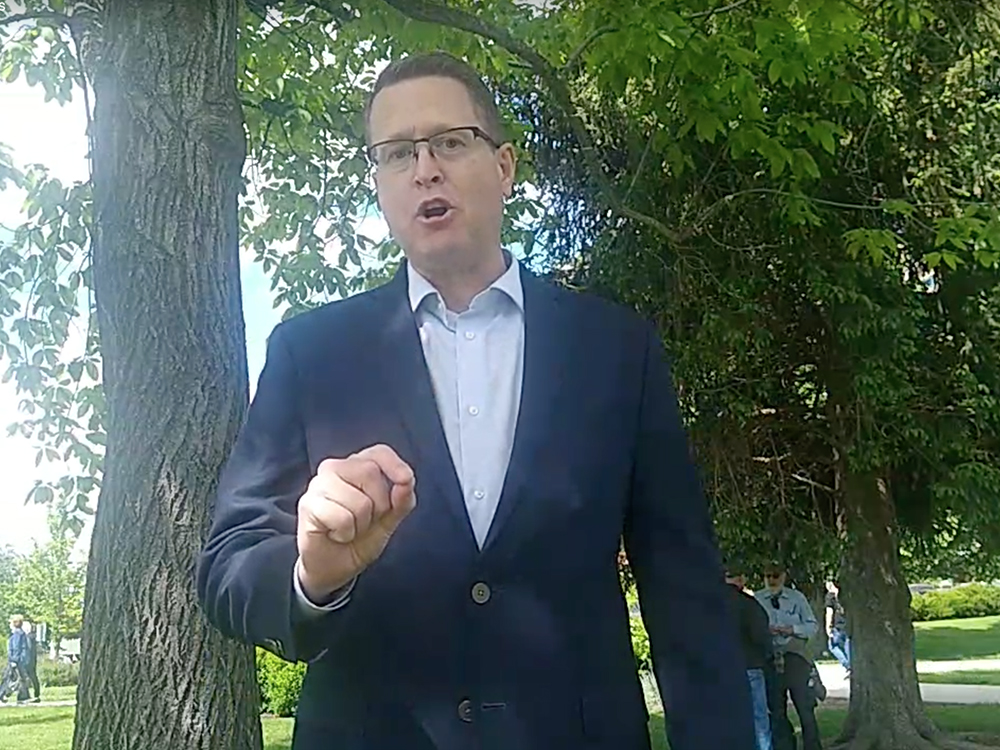
Pastor Matt Shea records a video in Coeur d’Alene, Idaho, shortly after members of a white nationalist group were arrested. Video screen grab
Last September, the Reawaken America tour, an unabashed Christian nationalist traveling exhibition that mixes right-wing politics, conspiracy theories and antipathy toward COVID-19 restrictions, hosted one of its rallies in Post Falls, a short drive from Coeur D’Alene. In addition to speakers such as Michael Flynn, onetime adviser to Trump, as well as Trump’s son Eric, the two-day festival included nighttime baptisms overseen by Shea and a minister from Altar Church.
Christian nationalism has many iterations, however, and divisions have emerged. Walsh, the Redoubt Realtor, said he was skeptical of any effort to push sectarian Christian theology on others in the region.
“I think we’d be fighting in no time,” he said.
There are even fissures among vocal Christian conservatives. Paul Van Noy, pastor of Candlelight Christian Fellowship in Coeur D’Alene, said Reawaken organizers originally approached him to host the September event, likely in consideration of Candlelight’s embrace of politics and clashes with LGBTQ rights activists; last year, local LGBTQ advocates pushed unsuccessfully to keep the church from being used as a polling location. And like Wilson’s congregation in Moscow, Candlelight has doubled in size since it refused to close during the pandemic. (Van Noy was so opposed to COVID-19 restrictions that he kept the church open even after he was hospitalized with the disease in 2020.)
Van Noy is unashamedly political — “I tell people what I think about candidates,” he said — but as he reviewed Reawaken’s proposal, Van Noy was struck by the inclusion of baptisms.
“All of a sudden someone says ‘We’re going to do baptisms,’” he said. “I’m asking the question, ‘OK, well, then who’s preaching the gospel? What gospel? Are they going to believe? Are they going to be told that if they’re baptized in water they’re saved?”
Van Noy pulled out, and after organizers cut off communication with him, he was forced to bum a ticket from a friend in order to attend.
He told Religion News Service, “I was appalled to hear, in the name of Jesus, some things that were said.”
But to Christian nationalism’s loudest detractors, focusing on these rifts misses the Panhandle’s forests for its towering evergreens. While sectarian varieties of Christian nationalism certainly exist, the version most ascendant — and the kind activists say is working its way through the state Legislature — relies not on theological purity but an alliance between conservative Christians who collectively oppose liberal policies and what they deride as secular culture.
That powerful puree of ideologies is something that, Walsh acknowledged, could unite even North Idaho’s famously isolationist Redoubters.
“Would they band together and say, ‘We’re all Christians, and we’re gonna go fight the liberals’? That’s possible,” he said.
(This story was was reported with support from the Stiefel Freethought Foundation.)
This story has been updated to correct Stephen Wolfe’s affiliation with Princeton University and Joe Alfieri’s title.
